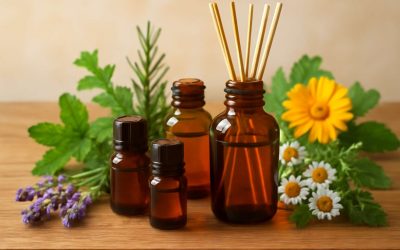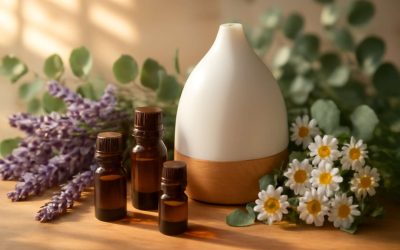Aromatherapy is the use of plant extracts, called essential oils, to improve your health and mood. These oils are extremely concentrated, so they’re not meant to be applied directly to your skin, but rather diluted into milder oils such as olive or coconut oil or put into a diffuser, humidifier or bath.
The oils are believed to work by affecting the limbic system through the sense of smell. This system is responsible for emotions, memory and learning. When inhaled, the scents stimulate a region of the brain known as the olfactory bulb. There they interact with other parts of the limbic system to produce characteristic physiological and psychological effects.
Many studies of the benefits of aromatherapy have been mixed or inconclusive, but many people find that certain scents can improve their mood and reduce stress and pain. Those with anxiety and depression may experience relief when using aromatherapy with lavender, which is thought to help ease these symptoms by decreasing cortisol levels. Other calming oils include peppermint and chamomile.
Those who want to promote relaxation or boost energy can try oils such as ylang ylang, sage and eucalyptus. Other oils with stimulant properties include citrus, ginger and thyme. Those who are looking for a natural cure for insomnia might try frankincense, sandalwood or helichrysum oils. Some experts suggest combining these oils with meditation, a practice that can help relieve anxiety and stress by reducing the frequency of waking up during sleep.
If you decide to use aromatherapy at home, choose high-quality products. Avoid “fragrance oils” or perfumes, which contain essential oils blended with chemicals, and opt instead for those that are certified organic. It’s also important to follow the directions for use. Overusing essential oils can irritate the skin and nasal passages, so it’s best to start with a small collection of oils and only add others as needed.
You can buy essential oils at most health food stores. However, it’s best to get them from a certified aromatherapist or a company that sells them in bulk to qualified practitioners. This helps ensure the quality and purity of the product. Look for a label that specifies the botanical of the oil and its therapeutic properties, and read the ingredients list to make sure there are no fillers or chemical additives.
If you’re pregnant or breastfeeding, consult your doctor before trying aromatherapy. Some oils should be avoided by those with certain medical conditions, including high blood pressure and a history of seizures. If you’re taking estrogen-dependent medications, don’t use oils such as fennel, sage or clary sage, as they can interfere with your treatment. In general, people with health conditions should talk to their doctors before starting any new therapy.



0 Comments